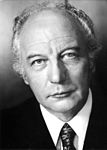West German federal election, 1972
|
|
|||||||||||||||||||||||||||||||||||||||||||||||||||||||||||
|
|||||||||||||||||||||||||||||||||||||||||||||||||||||||||||
|
|||||||||||||||||||||||||||||||||||||||||||||||||||||||||||
|
|
|||||||||||||||||||||||||||||||||||||||||||||||||||||||||||
| Party list election results by state: red denotes states where the SPD had the absolute majority of the votes; pink denotes states where the SPD had the plurality of votes; darker blue denotes states where CSU had the absolute majority of the votes; and lighter blue denotes states where CDU had the plurality of votes | |||||||||||||||||||||||||||||||||||||||||||||||||||||||||||
|
|||||||||||||||||||||||||||||||||||||||||||||||||||||||||||
Federal elections were held in West Germany on 19 November 1972. In the first snap elections since 1949, the Social Democratic Party remained the largest party in the Bundestag, winning 242 of the 518 seats.
The Social-liberal coalition of SPD and FDP had lost its majority after several Bundestag MPs (like former FDP ministers Erich Mende and Heinz Starke or SPD partisan Herbert Hupka) had left their party and become members of the CDU/CSU opposition to protest against Chancellor Willy Brandt's Neue Ostpolitik, especially against the de facto recognition of the Oder-Neisse line by the 1970 Treaty of Warsaw.
...
Wikipedia




